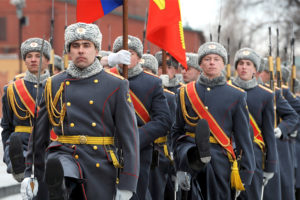Russia, Despite Military Ventures, Cut Defense Spending By Most In Decades

(Article ©2018 RFE/RL, Inc., Radio Free Europe/Radio Liberty – rferl.org – May 2, 2018 – also appeared at rferl.org/a/russia-despite-ventures-syria-ukraine-cut-military-spending-last-year-most-since-1998-economic-collapse-western-sanctions-recession/29203634.html)
Western sanctions and a long recession forced Russia’s military to slash spending by 20 percent last year, its first drop in nearly two decades, a closely followed think-tank report said.
Despite Russia’s flexing of its military muscle around the world, with its 2014 annexation of Ukraine’s Crimean Peninsula, its backing of separatists in eastern Ukraine, and its involvement in the Syrian civil war since 2015, Moscow has been forced to cut military spending in a way that throws future operations into question, the Stockholm International Peace Research Institute said in a report released late on May 1.
Russia’s sharp military cutback occurred while military spending reached a post-Cold War high elsewhere around the world in 2017, led by higher spending in the United States, China, and Saudi Arabia, the report said.
While global military spending rose by 1 percent to $1.74 trillion, Russia’s spending fell 20 percent to $66.3 billion, the report said.
As a result, Russia dropped to fourth place in the ranking of the world’s biggest military spenders, overtaken by Saudi Arabia, the report said.
It was Russia’s first military cutback since 1998, a year of major crisis when Russia’s economy collapsed and it defaulted on its debt. The following year Vladimir Putin took power as prime minister and, on New Year’s Eve, became president.
The report said the latest cuts in military spending were also due to economic woes — a deep, two-year recession brought on by a collapse in oil prices in 2014, and Western sanctions imposed over Russia’s aggression in Ukraine the same year.
“The military budget has been restricted by economic problems that the country has experienced since 2014,” said Siemon Wezeman, a senior researcher at the think tank.
Prior to last year, Russia protected the defense budget from cuts and instead pared spending in other areas, such as infrastructure and education, he said, but in 2017, it got to the point where Moscow had no option but to “spread the pain.”
“It’s no longer possible to keep defense at a high level or keep it growing,” Wezeman said. “For Russia, it means they may have to swallow their pride.”
Russia’s economy began a weak recovery with growth of 1.5 percent last year. But given the big fall in government revenue caused by the recession and sanctions, Russian spending on defense is expected to stay flat through 2020, or possibly even fall somewhat further, adjusted for inflation, he said.
Wezeman said the cuts have had the biggest impact on defense procurement and military operations because “those are the quickest things to cut.”
Wezeman told Reuters that Russia may have undertaken some of its military interventions since 2014 to show its military remained powerful even though its economy was weak.
“Russia definitely has a very clear feeling it has to show that it is still a major power, and you show that by undertaking operations in, for example, Syria, by showing up on the Atlantic Ocean with your navy,” he told Reuters.
The revenues Russia generates from exporting oil, gas, aluminum, and other commodities has rebounded since the recession but still remain far below levels set in 2014.
One question is whether Russia will have to cut military spending further in light of Putin’s recent call for more spending on social programs such as health care and education to support higher living standards. Some officials at the Kremlin have called for lower military spending to free up funds for such domestic initiatives.
The Kremlin said in March that Russia would cut its defense budget to less than 3 percent of gross domestic product within the next five years.
According to the think-tank report, the United States continues to spend the most on its military by far at $610 billion a year, accounting for 35 percent of global expenditures — more than the next seven highest-spending countries combined.
All 29 NATO allies together spent $900 billion last year, accounting for 52 percent of total world spending, it said.
China’s military spending of $228 billion as a share of world expenditures rose to 13 percent last year, up from 5.8 percent in 2008.
With reporting by AFP, dpa, and Reuters
